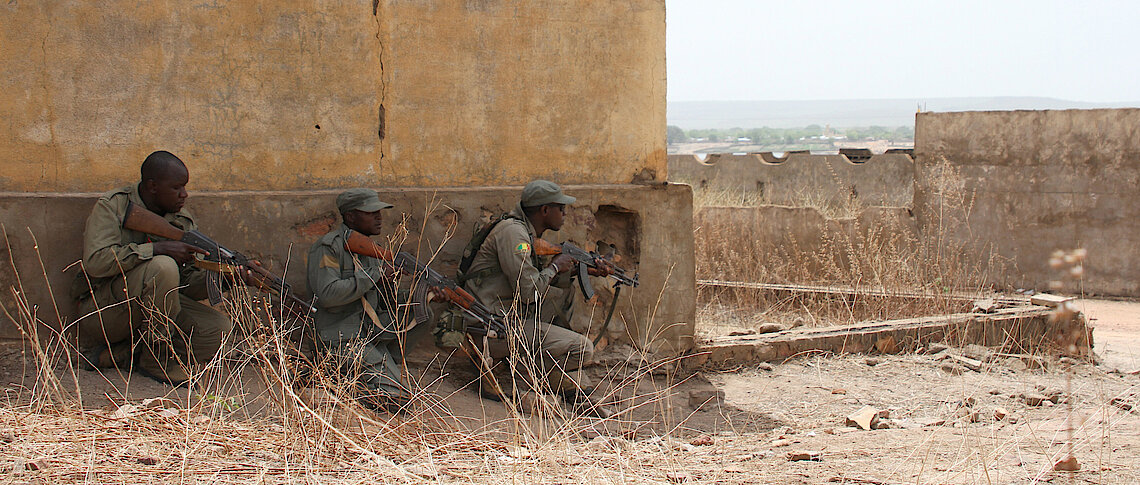In late March, hundreds attended a peace conference in Bamako, Mali, including former rebels and members of the opposition. They called for talks with Islamic jihadists, who continue to terrorise the region. The offer of dialogue followed the union on 2 March of four terrorist groups operating in the north and centre of the country under the Al-Qaeda banner.
The front, cumbersomely named “Group for the Support of Islam and Muslims”, is bad news for the floundering peace process, and threatens to further destabilise the already fragile Sahel region. Problems began in 2012 when Tuareg rebels and Islamist insurgents captured northern Mali before French troops pushed them back in early 2013. Northern Mali spans a desert-like area twice the size of Germany. It is nearly impossible to control, not least because of its shared borders with Algeria, Mauritania and Libya, traversed by terrorists, smugglers, bandits and nomads. These countries produce a significant chunk of the fighters and weapons. After the toppling of Libyan dictator Muammar Gaddafi in 2012, mercenary soldiers plundered whole weapons arsenals. The troops included Tuaregs from Northern Mali who returned home armed to the teeth.
A peace treaty between Tuareg-led rebels and Mali’s government has yet to come into force. Some 11,000 peacekeepers stationed in Mali since the deal have failed to stem the ongoing violence, and are themselves subject to attacks. Meanwhile in central Mali, fighters from the Macina Liberation Front, an Al-Qaeda subgroup, have begun operations in the Inner Niger Delta. Its members from the Peul community clash regularly with resident Bambara farmers – an ethnic dimension that, along with the Tuareg fight for independence, could prove fatal for the multi-ethnic Malian state.
Local scepticism
Malians are mostly dismissive of the peace process and international intervention. 41 percent of those surveyed for the Friedrich-Ebert-Stiftung said the security situation has worsened, against 32 percent who took the opposite view. 42 percent are disappointed with the UN peacekeeping forces saying they “do not protect the population from armed groups and terrorists”. Some even complained the troops were “hand in glove with the rebels” and had “contributed to an increase in the cost of living”.
Politicians and analysts in Mali largely take the same view. One former UN employee confided that troops are involved in drug smuggling. Alongside terrorism, the drugs trade is eroding stability in the region and has a direct impact on Europe. West Africa is now a trade and transit hub for South American cocaine, which ends up in the “narco-state” of Guinea-Bissau. Mali provides one of the main smuggling routes through the Sahara to the Mediterranean. High-ranking politicians in Bamako are also believed to have a hand in the drugs trade, which may explain their reluctance to fight the jihadists, who likewise receive funding from drug money.
This is just one of many charges raised against “the corrupt elites”. Almost two thirds of Malians surveyed by the FES say corruption is “unbearable”. Many blame the political, economic and social crises following the 2012 coup on President Ibrahim Boubacar Keita. According to one Malian army general, the international military intervention saved first and foremost the corrupt elites, who are more interested in their own enrichment than their country’s development.
But those who criticise international military intervention need to ask themselves what the alternative would be. Leaving Mali, which is in a similar state of decay as Libya, to fester is in neither the interest of Malians nor Europeans. The decision of France's new president, Emmanuel Macron, to make Mali his second official visit as he visits French troops there shows he also shares this view.
Push and pull
Mali and the Sahel have recently gained prominence in German foreign and security policy for an altogether different reason: migration. Already tens of thousands of school leavers, most of them poorly educated, face a life without prospects. The population boom in the Sahel region will encourage more refugees towards Europe. Mali has the second-highest birth rate in the world after Niger: if it remains unchanged, the population will triple to 60 million by 2050. Prime Minister Moussa Mara has warned his country cannot feed such numbers, but also admits that birth control remains largely taboo, due to cultural and religious expectations.
This precarious situation and the real danger that the centalised Malian state falls apart mean it is all the more important to find opportunities for dialogue with the jihadists, even though these are rare. The Peace and Reconciliation conference involving Malians themselves attempted to move in this direction. However, this goes against the policy of not speaking to international terrorists favoured by France and, under international pressure, the Malian government. Unfortunately, this has meant initiatives proposed by civil society have come to nothing.
Germany and the EU have few foreign and security policy options for stabilising the crisis-ridden Sahel region. A new “Jihadistan”, as predicted by “Le Monde”, is sadly a real possibility.






